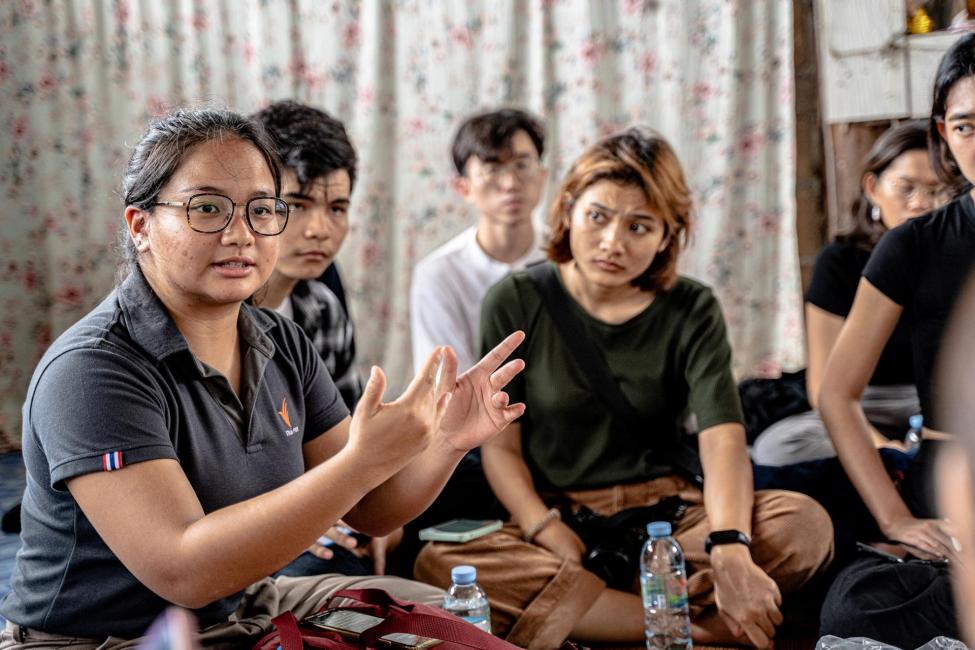-
Who We Are
WHO WE AREThe International Organization for Migration (IOM) is part of the United Nations System as the leading inter-governmental organization promoting since 1951 humane and orderly migration for the benefit of all, with 175 member states and a presence in over 100 countries.
About
About
IOM Global
IOM Global
-
Our Work
Our WorkAs the leading inter-governmental organization promoting since 1951 humane and orderly migration, IOM plays a key role to support the achievement of the 2030 Agenda through different areas of intervention that connect both humanitarian assistance and sustainable development.
Cross-cutting (Global)
Cross-cutting (Global)
- Data and Resources
- Take Action
- 2030 Agenda
Actions are informed by words, and how we act as a society and as individuals towards migrants is often shaped by what we read, hear and say about migrants. Findings from a recent assessment conducted with support from the IOM Development Fund on public perception towards migrants in Thailand bolster this statement.
In October 2023, IOM surveyed over 1,200 Thai nationals across three cities in Thailand and found that, while many individuals are welcoming towards migrant workers, their views and sentiments are heavily influenced by the news and stories on migration that they consume. This underscores the critical role of media in shaping public discourse, not just in Thailand, but across the globe.
Migration is as old as humankind, intricately woven into the fabric of every society. Yet, it is also a topic embedded with skewed narratives and misconceptions, fueling a global rise in anti-migrant sentiment — a modern-day infodemic. In Thailand, where migrant workers make up more than 10 per cent of the population, these narratives have real-world consequences.
As a Champion Country for the Global Compact for Safe, Orderly and Regular Migration (GCM), Thailand recognizes the urgency of addressing growing xenophobic sentiments and discrimination against migrants. To tackle this issue, in 2023, Thailand’s Ministry of Foreign Affairs (MFA) launched the project, “Promoting Evidence-Based Migration Discourse and Media Reporting in Thailand” with support from the IOM Development Fund. Building on the crucial work by the IOM Development Fund supported Global Migration Media Academy (GMMA), the aim of the project is to promote a more balanced narrative through training on migration reporting for Thai journalists, journalism students, government communication staff and civil society members.
During the joint public perception seminar organized by IOM and MFA in January 2024, the Vice Minister of Foreign Affairs H.E. Sihasak Phuangketkeow emphasized that the rise of anti-migrant sentiment globally and in the region demands immediate and collective action. He also urged the international community to counter these narratives and build an inclusive future where migrants are seen for their contributions, not just their circumstances. These actions, he underlined, would be in line with Thailand’s pledge under the GCM.
IOM’s perception survey also revealed that respondents are more open to welcoming migrants seeking employment compared to those seeking protection from persecution and conflict. This is aligned with the recent alarming rise in hate speech against migrants and refugees in the region, highlighting the influence of half-truths, sensationalism and negative portrayals in the media.
This means that journalists, reporters and communication professionals have a major responsibility. When they report with sensitivity, accurate facts and follow ethical standards, their stories hold the power to counter misinformation on migration.
“Media coverage or public statements sometimes give the impression that we live in an unprecedented age of migration, while migration levels have stayed relatively stable since the Second World War. Governments and media are powerful actors in shaping the public discourse and narratives on migration. In a time of increasing disinformation, they serve as a critical source for reliable information.”
Géraldine Ansart, Chief of Mission, IOM Thailand
“There is a missing link for journalists to access accurate information on migration that impedes them from understanding the realities of migrants and reporting the story in its full complexity. We need more robust solutions to equip journalists with the necessary resources.”
Thapanee Eadsrichai, Founder of The Reporters, an independent Thai media outlet covering human rights and social issues
IOM and MFA’s new media training initiative aims to strengthen the capacity of media and communication professionals and students in Thailand to report on migration in a way that respects the rights of migrants and acknowledges their contributions. The project will leverage expertise from leading Thai universities, such as Chulalongkorn and Mahidol, to ensure the training is grounded in evidence and meets the needs of both aspiring and professional journalists.
Stories and balanced reporting can truly harness the power of migration and improve the lives of migrants and the communities where they belong. Ultimately, the initiative will bring together government, civil society, media, academia and youth to promote a whole-of-society approach in forming a more inclusive society where migrants can fully access and enjoy their rights without discrimination.
This will contribute to the realization of GCM Objective 16 — empowering migrants and societies to realize full inclusion. The overall project objective aligns with IOM’s Strategic Vision of “Facilitating Pathways for Regular Migration” by contributing to Short Term Outcome 3D.1: “The public narrative of migration is well-informed and balanced, and the human rights of migrants and their contribution to local and national development are recognized.”
This story is part of the IOM Development Fund Spring Newsletter. Discover more about their Newsletter here.



